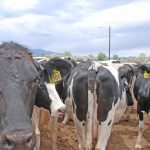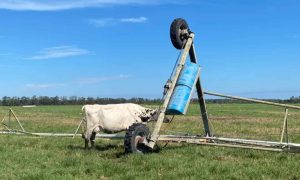
Wisconsin dairy groups are split on how the new Biden administration should handle a trade dispute with Canada over exports.
The Wisconsin Farmers Union signed on to a letter from farm and food advocacy organizations calling on the Biden administration to drop a challenge against Canada started by the previous administration.
In December, then-U.S. Trade Representative Robert Lighthizer challenged how Canada was implementing policies under the new U.S.-Mexico-Canada Agreement, a trade deal that the Trump administration touted as providing farmers with fairer access to the Canadian dairy market.
Lighthizer claimed Canada was undermining American producers’ ability to export by reserving a portion of dairy tariff-rate quotas for Canadian processors.Tariff-rate quotas (TRQs) allow a certain amount of product to be imported at a lower tax rate under Canada’s federal dairy supply management system and were seen as a way for U.S. producers to increase exports to the country.
Darin Von Ruden, president of the Wisconsin Farmers Union, said he thinks the fight with Canada is misguided.
“The actions that the Trump administration wanted to see would have actually cost the Canadian union workers their jobs,” Von Ruden said. “So we just felt, in consultation with the dairy farmers from Canada too, that this is just an unwarranted action, really. It’s another hit or attack on the Canadian dairy supply management program.”
Von Ruden said only the largest dairy processors stand to gain anything from the dispute while smaller producers continue to feel the squeeze of outdated domestic milk pricing policies.
And he said a growing number of farmers would like to see the U.S. adopt policies similar to Canada’s, which are aimed at protecting farmers from an overproduction of milk.
“At some point in time, we’ve got to start listening to the producers and what the producers want rather than big agriculture and big dairy because it just isn’t working for this country to continue to try to undercut other markets to get in there,” Von Ruden said.
But other Wisconsin dairy groups feel the policy fight with Canada is needed to protect the market access that was won with renegotiating the trade agreement between the three countries in North America.
Edge Dairy Farmer Cooperative also sent a letter to the Biden administration this week, encouraging officials to continue talks with Canada on the trade dispute.
John Holevoet, director of government affairs, said all sizes of farms sell to large milk processors, so ensuring they have fair market access is not just about the largest players.
“The issue, at least with the Canadians, is that our small part of USMCA, particularly as it relates to access to the Canadian dairy market, is just one thing that we got out of that agreement,” Holevoet said. “We all negotiated in good faith. We all got both benefits and also made concessions to reach that agreement. So it’s not at all unreasonable for us to make sure that everyone is following that agreement in good faith now and following through on their obligations. That’s just good negotiation tactics.”
Holevoet said the current debate among U.S. producers is in some ways a proxy fight over the future of domestic dairy policy. He believes those conversations with the Biden administration are on the horizon, especially as ag groups look to the next federal farm bill.























